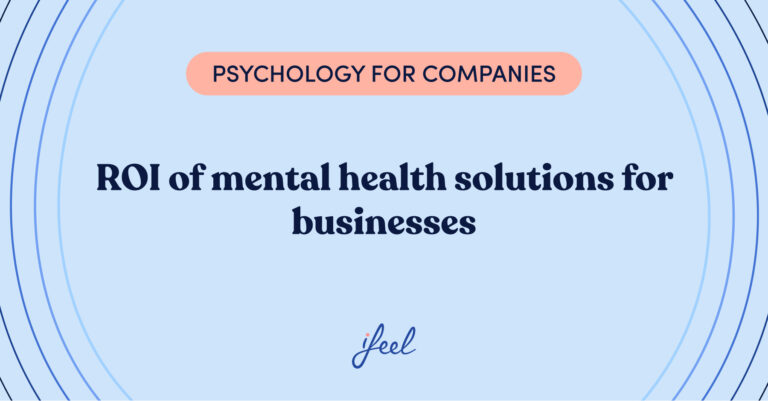In this article, we will discuss a recurring topic that affects a vast amount of people: how to reduce anxiety in a healthy way. We all want our anxiety to disappear because it’s a feeling we associate with discomfort and can affect us in the long run.
Remember anxiety is our body’s reaction that manifests itself so that we can adapt to a particular circumstance and that, sooner or later, we will feel again. The important thing is to understand why it happens to us, how to reduce anxiety, and, most importantly, to detect when it becomes excessive and may require a professional’s intervention.
As is the case with stress, a little anxiety doesn’t hurt: if we aren’t active enough, if we don’t worry about anything, if we can’t get out of bed, everything would move too slowly. Our body needs a certain dose of pressure to function and has the mechanisms necessary to activate, perform the corresponding tasks, and, once these are finished, deactivate enough to continue with whatever needs to be done.
However, sometimes the nuts and bolts of these mechanisms don’t correspond (they become loose, they can be too tight, some even get lost.) Then our pattern of activation-deactivation stops being useful and starts to cause problems. This is why many people are starting to seek more and more online support to learn how to reduce anxiety, whether in their personal or professional life.

This is what happens when normal or manageable anxiety becomes excessive; we enter a state of restlessness, worry, and physiological activation that has no use, which wears us down and which, if it gets out of control, it can become a serious health problem.
If you feel your anxiety levels are too high, you are probably feeling it in your body, your emotions, and your mind. Remember, anxiety does not manifest itself in the same way in everyone. Some people develop digestive or skin problems or sleep badly, due to their mind whirring without being able to switch off. However, you are likely to notice that you are either worried about something (or everything) or that you are trying to control too many things but never reaching your end goal. There is a good reason for that: anxiety is a very close relative of fear.
How to reduce anxiety in a healthy way
So, how to reduce anxiety? It does not make sense that, if you are someone that is very restless, active, and with a tendency to worry about everything, you try to change overnight into the opposite. It is important that you find a way to feel better because excessive anxiety that is prolonged over time is detrimental to your health and well-being. Remember that we are not here to worry about everything or to suffer, but to take care of ourselves without worrying and seeing everything around us as a threat. Follow our highlighted tips on how to reduce anxiety:
1. First of all, stop.
If you can stop, even if it is only five seconds, you have already taken the first step on how to reduce anxiety. It is not just about noticing you have it, but that you are fully conscious, even if it is only during those five seconds, that you have anxiety.
2. Don’t fight against your anxiety
Or you’ll just make the situation worse. This will not help you relax. If you get into fights with anxiety you are fighting against yourself. It is not a very kind way to treat yourself and it is not a good method to relax: it will only add more tension.
3. Try the opposite
Tolerate some of that unease that seems to be eating you up inside, give it a little space instead of suppressing it, and then stop again. It is you who has anxiety so you can let it bother you a little bit and then stop.
4. Check your everyday habits
You may be too active. Make concrete decisions, try to do without those activities that are overwhelming you and are not necessary. Take care of yourself: make sure you have an organized schedule, eat well and, above all, prioritize your time off to rest: sleeping badly is not a suitable habit in order to lead a healthy life and is just as bad as not eating properly.
5. Use your body to balance your level of anxiety
This does not just mean saying in a low voice “Relax, relax, relax”, but to do real relaxation and meditation exercises (for example those which involve deep breaths). You can combine it with some sport to help release excess energy.
6. Consider learning meditation techniques
Some of them are very easy to practice and, although they do not always get you to relax fully, they will help you tolerate your inner discomfort and to see certain things that worry you in the right light. If you aren’t sure how to start, there is a lot of material available online. For example, with ifeel’s well-being program for companies, you can access this material via the app.

How to reduce anxiety with ifeel’s program for companies
Remember that, above everything, what is important is your wellbeing. If you think that your relationship with anxiety is becoming complicated and aren’t sure how to reduce anxiety, it is useful to contact an expert who will help you to understand what is going on and how you can find a solution.
As mentioned above, ifeel has created an emotional well-being program for companies, designed by its team of leading psychologists to help companies help their employees manage their mental health.
Thanks to this partnership, HR managers can receive personalized, data-driven advice on how to reduce anxiety in the workplace with the help of various tools available to them via our program.
In addition, ifeel’s emotional well-being program for companies offers employees a mental health care service structured at different levels depending on individual needs. This way, employees can access various mental health care tools with ifeel’s app. On level two, they can receive emotional support through a chat with one of our platform’s licensed psychologists. If additional support is needed, they can access the third level of the program: online psychological therapy with a psychologist specialized in cases such as theirs.
Get in touch today and request more information on our well-being program for companies. Your mental health is our priority. You may also be interested in this post about employee mental health.











